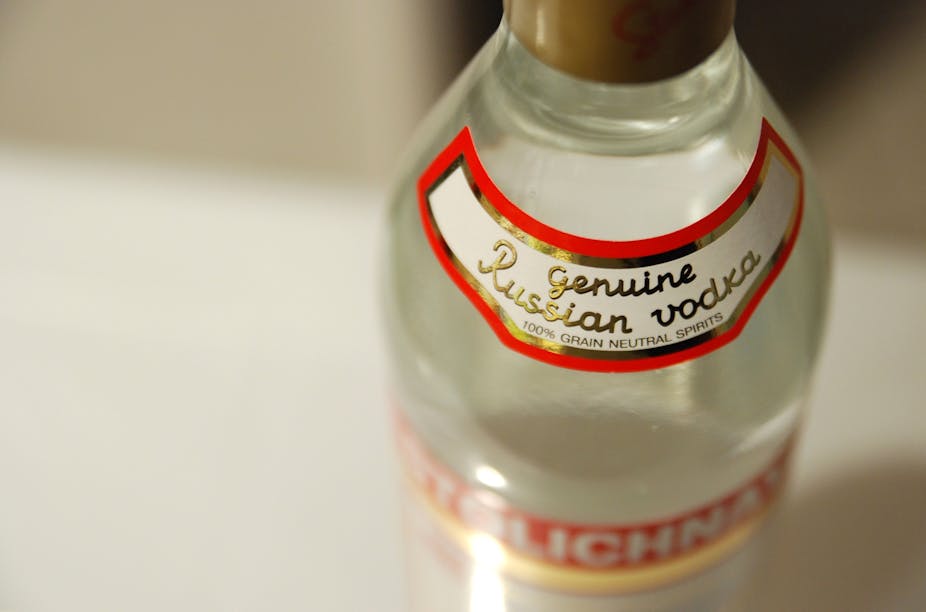Russians’ love of vodka is no secret and neither is the impact the beloved drink has had on the country’s drinkers. It has been implicated in high death tolls and spates of vodka poisonings as poorer Russians turn to cheaper, illicit supplies. In a bid to tackle vodka’s toll, the government has been incrementally raising prices.
Now a new study has confirmed vodka as the major cause of premature death in Russia. In the largest study of its kind, the drinking habits of 151,000 men and women were followed over a ten-year period by a team from the Russian Cancer Research Centre in Moscow, the University of Oxford, and the WHO International Agency for Research on Cancer in France. The results show that alcohol consumption is a major factor in Russian men dying before the age of 55, with vodka as their preferred poison.
Currently a quarter of all Russian men die under the age of 55, which compares to just 7% of men in the UK. Alcohol consumption, along with smoking, appears to be the main reason for this difference. The study tracked mortality rates over the last 30 years and found large fluctuations in life expectancy over this period that closely relate to alcohol consumption. Richard Peto, from the University of Oxford and co-author of the study, said, “the main thing driving these wild fluctuations in death was vodka.”
The researchers said that changes in alcohol policy, such as price changes and restricted alcohol sales, closely matched the fluctuations in mortality rates.
Death by drinking
The study also provides ample evidence of another unique feature of Russian drinking culture, zapoi, where Russians engage in a period of continuous drinking for two days or more. But the researchers found that even in groups of men that consumed the most – those who drank an average of about two and half litres of vodka a week – there were periods of abstinence of up to three days a week. The researchers suggest, then, that high death rates come not only because Russians drink a lot, but from episodes of binge drinking.
A corresponding study that examined the causes of death of 50,000 adults and carried out by the same research team determined that the main causes of premature death in Russia were alcohol-related. These include alcohol poisoning and liver disease, as well as accidents, violence and suicide – all of which have strong links to excess drinking.
Nearly half the men and over 10% of the women in the study were reported to have drunk at least a bottle of vodka a week. Many of them were reported by their families to have drunk on average about a bottle of vodka a day.
The idea that alcohol consumption is contributing to high death rates in Russia may not come as a surprise. But while many studies and reports have shown that alcohol, and especially vodka, is a major cause of death, the size of this study is significantly larger than previous attempts to document Russian drinking habits and mortality.
Peto said he was “surprised at how clean the results were, given the problems with collecting information on drinking”. If anything, they observed that their estimates “must substantially underestimate the real hazards of persistent heavy drinking”.
Policy power
There is a remarkable degree of correlation between mortality rates, risk of premature death and alcohol policy. When Gorbachev restricted alcohol sales in the mid-1980s, alcohol use decreased by around 25% and the death rate following this dropped significantly.
But between 1990 and 1994, following the collapse of the Soviet Union, life expectancy fell by six years for men. This period saw the abandonment of state alcohol regulation and the country was flooded with cheap, strong alcohol. “This coincided with a catastrophic increase in mortality,” epidemiologist David Leon said.
He added: “The causes of death causing this precipitous decline in life expectancy were conditions that are unequivocally due to alcohol.”
The re-introduction of alcohol regulations in 2006 led to a decline in alcohol consumption and a corresponding increase in life expectancy.
The study is also the first to examine women’s drinking habits as well as men’s. “This study confirms that alcohol consumption at one point in time has an appreciable effect on mortality in both men and, importantly, in women too,” Leon said. They are not suffering to the same degree, but it is important to establish that this issue affects women as well.

